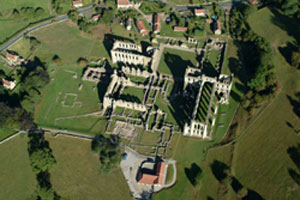 |
 |
 |
 |
 |
 |
 |
|
Rievaulx Abbey: lands and possessions (1/15)
The Cistercians sought to live simply by the fruits of their own labour and in order to sustain a self-sufficient community each abbey required a variety of possessions, such as arable and pastoral land, woodland, mills, fisheries and mineral rights. Upon its foundation, every Cistercian abbey was endowed with the resources necessary to provide for the community. The monks had then to acquire additional lands and rights to support the abbey’s growth. The acquisition of lands and rights by Rievaulx was in many ways similar to that of other Cistercian abbeys throughout the country. A modest grant from the founder, Walter Espec, provided the essential resources for the community to establish monastic life. A period of slow and steady growth was followed in the mid-twelfth century by an economic high, with a considerable increase in the number and geographical spread of benefactions. The thirteenth century saw a tailing off in patronage and in the later Middle Ages there was a change in the nature of land-holding, as some of the abbey’s lands were now leased.(1) The monks acquired a variety of landholdings to provide for all aspects of monastic life. These included arable and pastoral lands, which were largely located to the north and east of abbey; cereal crops were grown to the north-west. The community had fisheries in the North, by the Lower Tees valley, and wool production was concentrated in the Vale of Pickering.(2) In this section you can read a brief chronological survey of how and where Rievaulx acquired its holdings, of the motives of its benefactors, and of the various kinds of lands and possessions that the community held: arable and pastoral lands, woodland, mills, fisheries and turburies, and urban holdings.
|
